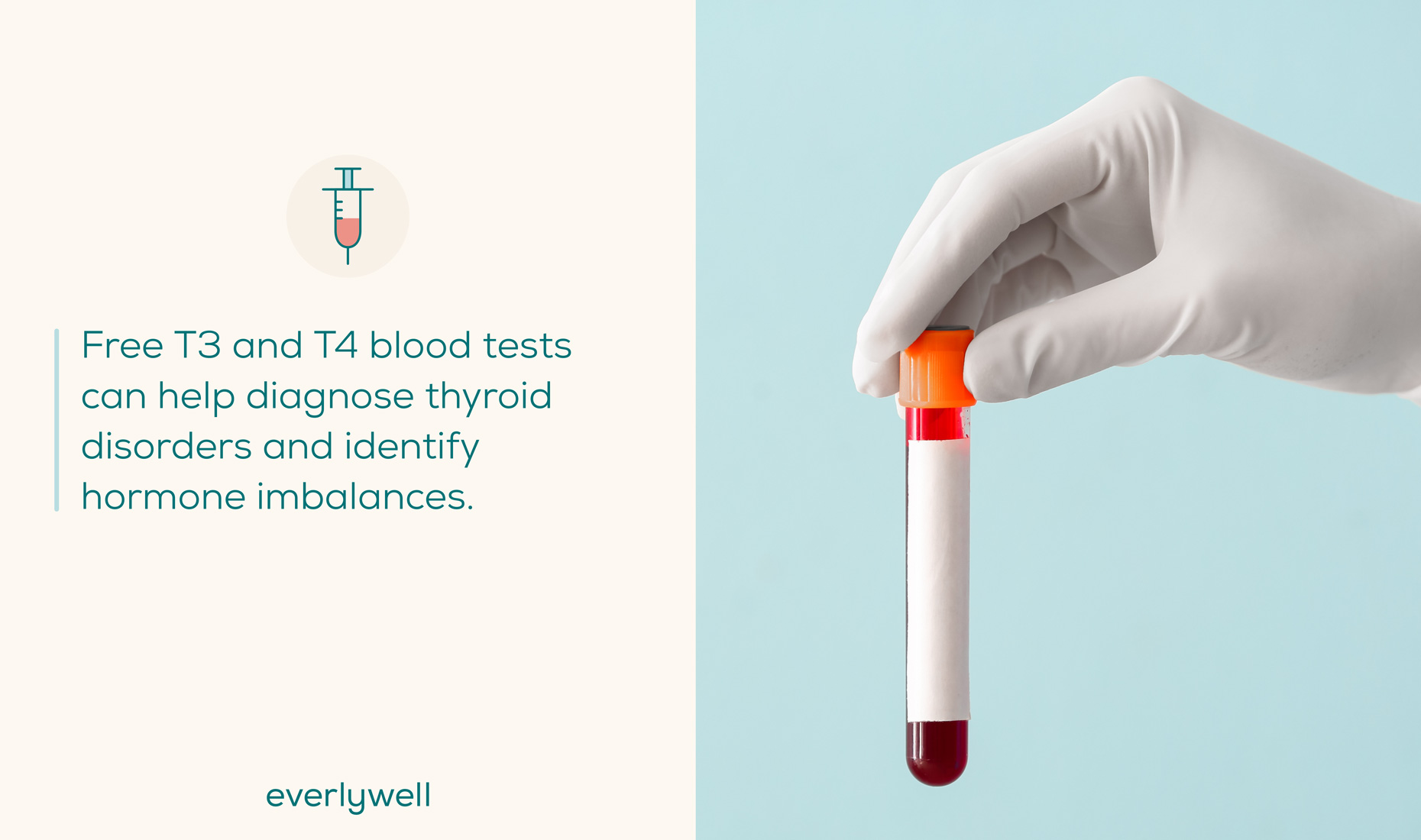
What Are Free T3 and T4 and How Can You Test for Them?
Medically reviewed on June 27, 2022 by Jordan Stachel, M.S., RDN, CPT. To give you technically accurate, evidence-based information, content published on the Everlywell blog is reviewed by credentialed professionals with expertise in medical and bioscience fields.
T3 (triiodothyronine) and T4 (thyroxine) are hormones that the thyroid gland produces to control the body’s energy use. These hormones help regulate multiple functions—from metabolic rate to brain development—and are useful markers when testing for disorders like hyperthyroidism and hypothyroidism.
T3 and T4 exist in two forms — bounded and free. Bounded T3 and T4 attach to proteins in the blood, while free T3 and T4 flow through the bloodstream independently. Because free T3 and T4 can interact with the body’s tissues, they are often considered a better indicator of thyroid function when used alongside other thyroid hormone tests.
Testing T3 and T4 levels is one of the best ways to identify a thyroid hormone imbalance and diagnose common thyroid disorders. Read on to learn more about how the body uses these thyroid hormones and how you can test for them.
Table of Contents
- T3 vs. T4 vs. TSH
- Healthy Thyroid Hormone Levels
- What Happens if T3 and T4 Levels are Too High or Too Low?
- Thyroid Testing Option
- When To Test Your Thyroid Levels
- How To Support Your Thyroid Health
T3 vs. T4 vs. TSH
While T3, T4, and TSH (thyroid-stimulating hormone) are all thyroid hormones, it’s important to understand the differences between the three when thinking about thyroid health. Below, we’ll cover the key functions of each hormone and how they interact with one another.
| Hormone | Purpose | Produced By |
|---|---|---|
| T3 (Triiodothyronine) | Regulates key functions like metabolic rate, digestion, and brain development | Thyroid gland |
| T4 (thyroxine) | Regulates thyroid hormone levels and is converted into T3 | Thyroid gland |
| TSH (Thyroid Stimulating Hormone) | Stimulates T3 and T4 production when levels drop too low | Pituitary gland |
Triiodothyronine (T3)
T3 makes up about 20% of the total hormones the thyroid produces and is considered the active form of thyroid hormone. Because the body’s hormone receptors are better able to use it than T4, enzymes called deiodinases convert inactive T4 into T3.
T3 is mainly responsible for interacting with organs and tissues in the body to regulate metabolic rate, body temperature, digestive functions, heart function, brain development, and skin and bone maintenance. Once T3 enters the bloodstream, it interacts with cells throughout the body to perform these functions.
Thyroxine (T4)
T4 makes up about 80% of the total hormones produced by the thyroid. While T4 is largely inactive, it still plays an important role in regulating energy use and other essential functions. The body needs more T3 than the thyroid can produce on its own, so enzymes in the liver and kidneys convert T4 into T3.
T4 also plays a crucial role in regulating the body’s thyroid hormone levels. Increasing T3 and T4 levels in the bloodstream causes the body to stop producing TRH (thyroid-releasing hormone), the hormone responsible for triggering the production of TSH, T3, and T4. If T3 and T4 levels fall too low, the body will begin producing TRH again, restarting the feedback loop. This process ensures that the body’s thyroid hormones remain balanced.
Thyroid Stimulating Hormone (TSH)
TSH is the hormone responsible for triggering T3 and T4 production. When thyroid hormone levels in the bloodstream drop, the pituitary gland begins producing TSH, which then signals the thyroid gland to produce more T3 and T4. Once these hormones reach a high enough level, TSH production stops.
Healthy Thyroid Hormone Levels
For most people, T3 and T4 levels within a certain range indicate that the thyroid gland is functioning as it should.
Balanced Free T3 levels
In most healthy adults, normal free T3 levels range from 130 to 450 pg/dL. Pregnancy, age, and medical history can all impact T3 levels, so it’s important to work with a medical professional to determine your healthy range.
Balanced Free T4 Levels
Normal free T4 levels in adults typically range from 0.7 to 1.9 ng/dL. However, the normal range may be different for people who are taking certain medications to regulate thyroid hormones or who have a history of thyroid cancer or pituitary disease. It’s always best to consult with a medical professional if you aren’t sure what’s normal for you.
What Happens if T3 and T4 Levels are Too High or Too Low?
Free T3 and T4 levels in the blood can reveal a lot about thyroid health. According to the American Thyroid Association, high T3 or T4 levels could be a sign of hyperthyroidism, a condition caused by an overactive thyroid gland. In contrast, low levels of these hormones could point to hypothyroidism, a condition caused by an underactive thyroid.

If a medical professional determines that you have low or elevated levels of T3 or T4, they will likely test your blood’s TSH levels to help determine the cause. For example, elevated TSH and low T4 could indicate that there is a problem with the thyroid gland, while low TSH and T4 could point to a problem with the pituitary gland, the organ responsible for producing TSH.
Symptoms of High T3 or T4
Hyperthyroidism often causes elevated levels of T3 or T4 in the bloodstream. If you have undiagnosed hyperthyroidism, you may experience one or more of the following symptoms:
- Unexplained weight loss
- Rapid heart rate
- Increased irritability or nervousness
- Increased appetite
- Muscle weakness
- Diarrhea or more frequent bowel movements
- Swelling in the neck
- Vision changes
- Intolerance to heat
- Hair loss
- Difficulty sleeping
Symptoms of Low T3 or T4
Low T3 or T4 levels are often caused by hypothyroidism. If your body isn’t making enough thyroid hormones, it can cause the following symptoms:
- Unexplained weight gain
- Fatigue
- Intolerance to cold
- Constipation
- Muscle weakness
- Depression
- Memory issues
- Slowed heart rate
- Muscle and joint pain or stiffness
- Depression
- Swelling in the neck or face
Thyroid Testing Options
If you are experiencing any of the symptoms above or your healthcare provider suspects that you have a thyroid condition, you could benefit from a thyroid hormone test. Some of the most common testing options include:
Free T3 Tests
Free T3 tests are used to identify low or elevated levels of triiodothyronine and can help diagnose hyperthyroidism and/or hypothyroidism. To perform this test, a medical provider takes a blood sample and analyzes it to measure the amount of free T3 in the blood. If your results come back abnormal, your healthcare provider may also test your T4 and TSH levels to determine what is causing the imbalance.
Free T4 Tests
The method for free T4 testing is typically identical to T3 testing and is often performed at the same time. A medical professional can perform a blood test to measure your T4 levels, or you can order an at-home thyroid test that uses a finger prick sample to measure free T4. After reviewing your results, your healthcare provider may perform further tests to confirm the results.

TSH Tests
TSH testing often coincides with T3 and T4 testing and can help identify the cause of a hormone imbalance. A TSH test is a blood test that medical professionals use to measure the amount of TSH in the bloodstream. Because TSH is considered the most sensitive marker for thyroid conditions, it’s commonly measured to diagnose hypothyroidism and hyperthyroidism.
If you want to measure your TSH levels from the convenience of home, you can use an at-home thyroid test that tests for all three thyroid hormones.
Thyroid Antibody Tests
Thyroid peroxidase (TPO) antibodies are a type of antibody that binds to thyroid enzymes and suppresses thyroid function. If high levels of TPO antibodies are present in the blood, it could point to an autoimmune disorder like Hashimoto’s disease or Graves’ disease. Your healthcare provider may perform a blood test to measure TPO antibodies if you have an autoimmune disorder or if they suspect you are at risk of developing one.
An at-home thyroid test can also measure your TPO antibody levels. If your results are abnormal, make an appointment with your healthcare provider to discuss further thyroid testing options.
At-Home Thyroid Test
If you suspect that you might have a thyroid condition, you can order an at-home thyroid test kit. These tests use finger prick sample collection methods to measure your free T3, Free T4, TSH, and TPO antibodies levels and can aid in diagnosing thyroid conditions. If your results come back abnormal, be sure to share the results with your healthcare provider.
When To Test Your Thyroid Levels
T3, T4, and other thyroid hormone tests are useful tools for diagnosing thyroid dysfunction and certain autoimmune conditions. If you are experiencing symptoms of hyperthyroidism or hypothyroidism, talk to your healthcare provider about testing options. An at-home thyroid test is a great option if you have a family history of thyroid disease or want to be better prepared for your next medical appointment.
How To Support Your Thyroid Health

It’s important to take steps to support your thyroid health, especially if you have a thyroid disease or thyroid-related autoimmune disorder. In addition to taking any prescribed medications, follow these tips to maintain a healthy thyroid.
Exercise Regularly
Getting enough exercise is essential for supporting your thyroid and overall health. If you have hypothyroidism, easing into a low-impact exercise routine can help improve thyroid function and boost your metabolism. This can also help reduce fatigue, manage weight, and ease constipation in people with reduced thyroid function.
That said, you should talk to your healthcare provider before beginning a new exercise routine if you have hypo- or hyperthyroidism. If these conditions are not well-controlled with medications, too much exercise could make symptoms worse. In people with hyperthyroidism, overexertion can increase the risk of heart failure and other complications.
Maintain a Balanced Diet
Maintaining a well-balanced diet can improve one’s overall health and help manage symptoms of certain thyroid disorders. If you have hypothyroidism, consuming plenty of fiber and iodine-rich foods may help improve digestion and reduce the risk of developing an iron deficiency, one of the leading causes of hypothyroidism worldwide. Foods rich in antioxidants, B vitamins, and iron may also reduce symptoms of hyperthyroidism.
If you have been diagnosed with a thyroid disorder, talk to your healthcare provider before making any diet changes. They can provide the best advice on foods to avoid and symptoms to look out for when making significant changes to your diet.
Manage Stress
When you experience high levels of stress, the adrenal system can quickly become fatigued and T3, T4, and TSH production decreases. This is part of the body’s normal response to stress, but it can cause problems over time in people with thyroid conditions. For example, increased stress has been linked to the development of Graves’ disease and can make symptoms of hyperthyroidism worse.
Finding healthy ways to reduce stress is essential for maintaining your thyroid health and managing symptoms of certain thyroid conditions. This could be as simple as making room in your schedule for activities you enjoy or finding ways to lighten your workload. If you’re worried about how stress is affecting your thyroid function, you can also ask your healthcare or mental health provider for advice.
T3 and T4 play a key role in regulating metabolism and keeping thyroid hormone levels in check. If you’re curious about your T3 and T4 levels or suspect that you could have a thyroid condition, make an appointment with your healthcare provider and consider ordering an at-home thyroid hormone test kit.
Related content
What is thyroid-stimulating hormone (TSH)?
What are the potential early signs of thyroid problems?
How to understand thyroid levels
Article Sources
- Effects of Thyroid Hormone Enzyme Blocking on Hypothyroidism. CinicalTrials.gov. URL. Accessed May 26, 2022.
- Thyroid Function Tests. American Thyroid Association. URL. Accessed May 26, 2022.
- T3 (Triiodothyronine) Test. Cleveland Clinic. URL Accessed May 26, 2022.
- Thyroid Hormone. Cleveland Clinic. URL. Accessed May 26, 2022.
- Thyroid Function Tests. American Thyroid Association. URL. Accessed May 26, 2022.
- T3 Test. Mount Sanai. URL. Accessed May 26, 2022.
- What are Normal Thyroid Hormone Levels? UCLA Health. URL. Accessed May 26, 2022.
- Thyroid Function Tests. American Thyroid Association. URL. Accessed May 26, 2022.
- Hyperthyroidism. Cleveland Clinic. URL. Accessed May 26, 2022.
- Hypothyroidism (Underactive Thyroid). Mayo Clinic. URL. Accessed May 26, 2022.
- Thyroid Peroxidase Antibody Test: What is It? Mayo Clinic. URL. Accessed May 26, 2022.
- Thyroid Disease May Run in Your Family — and You Might Not Know It. Cleveland Clinic. URL. Accessed May 26, 2022.
- Exercise and Diet Risks Associated With Uncontrolled Thyroid. Cleveland Clinic. URL. Accessed May 26, 2022.
- Hyperthyroidism. Mount Sanai. URL. Accessed May 26, 2022.
- Stress and Hormones. Indian Journal of Endocrinology and Metabolism. URL. Accessed May 26, 2022.
